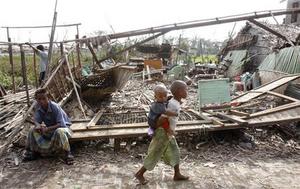"We're outraged by the slowness of the response of the government of Burma (Myanmar) to welcome and accept assistance," U.S. Ambassador to the U.N., Zalmay Khalilzad, told reporters.
"It's clear that the government's ability to deal with the situation, which is catastrophic, is limited."
Comment: Hurricane Katrina was also catastrophic, as well as the US government's dealing with that situation.

|
| ©REUTERS/Stringer |
| Survivors are seen at their home, which was destroyed by Cyclone Nargis, near the town of Kyaiklat, southwest of Yangon, May 7, 2008. |
In Myanmar, desperate survivors cried out for aid nearly a week after 100,000 people were feared killed by Cyclone Nargis.
The United States is awaiting approval to start military aid flights. The U.N. food agency and Red Cross/Red Crescent said they had finally started flying in emergency relief supplies after foot-dragging by the military junta.
U.N. Secretary-General Ban Ki-moon is talking directly with the junta's senior general, Than Shwe, to persuade him to remove obstacles, U.N. humanitarian affairs chief John Holmes said.
U.S. ambassador Eric John told a news conference in Bangkok earlier that the United States and Thailand thought the Myanmar generals had agreed to let a U.S military cargo plane fly in supplies to the reclusive southeast Asian country.
But that turned out to be premature.
"We don't have permission yet for the C-130 to go in, but I emphasize 'yet"' John said.
Approval for such a flight would be significant, given the huge distrust and acrimony between the former Burma's generals and Washington, which has imposed tough sanctions to try to end 46 years of unbroken military rule.
Witnesses have seen little evidence of a relief effort under way in the hard-hit Irrawaddy delta region.
"We'll starve to death if nothing is sent to us," said Zaw Win, a 32-year-old fisherman who waded through floating corpses to find a boat for the two-hour journey to Bogalay, a town where the government said 10,000 people were killed.
AID PLANES ARRIVE
The storm pulverized the delta on Saturday with 190 km (120 mph) winds followed by a massive 12 ft wave that caused most of the casualties and damage, virtually destroying some villages. It was the worst cyclone in Asia since 1991, when 143,000 people were killed in neighboring Bangladesh.
The United Nations estimated at least 1.5 million people in Myanmar have been "severely affected," Holmes said. He was "disappointed" with the lack of progress being made in getting U.N. aid in, he said.
State television on Thursday night did not give an update of the death toll, which stood at 22,980 with 42,119 missing as of Tuesday. Diplomats and disaster experts said the real figure is likely to be much higher.
"The information that we're receiving indicates that there may well be over 100,000 deaths in the delta area," said Shari Villarosa, charge d'affaires of the U.S. embassy in Myanmar.
About 1 million were left homeless.
U.N. officials who had earlier complained the generals were putting up obstacles to an emergency airlift, said a half-dozen cargo planes had been allowed to land at Yangon airport.
The Red Cross/Red Crescent confirmed its first aid plane took off from Kuala Lumpur, carrying six tonnes of shelter materials.
World Food spokesman Paul Risley said aid agencies normally expect to fly in experts and supplies within 48 hours of a disaster, but nearly a week after this cyclone, few have been able to send reinforcements into Myanmar.
France suggested invoking a U.N. "responsibility to protect" to deliver aid to Myanmar without the government's approval, but its bid to make the Security Council take a stand was rebuffed on Wednesday by China, Vietnam, South Africa and Russia.
German Foreign Minister Frank-Walter Steinmeier called his Myanmar counterpart Nyan Win on Thursday and urged him to make it possible for international aid workers and relief organization to reach the areas hit by the cyclone.
Some opponents accuse the junta of stalling because they do not want an influx of foreigners into the countryside during Saturday's referendum on an army-drafted constitution that looks set to cement the military's grip on power.
Medicins sans Frontieres, which has 1,238 people in Myanmar, said it was ferrying aid into the delta via trucks and boats.
"We are focusing on those still alive; 50 percent of them have wounds and they are infected," MSF official Frank Smithius in Myanmar told Australian radio. "Because of the winds and high water, people got smashed around."
Jean-Michel Grand, executive director of Action contra la Faim in London, said the logistical obstacles were formidable.
"The roads are very poor or destroyed, and in many cases there were no roads before. Everybody's looking at boats as an alternative. It's going to be a massive logistics challenge.
Thai Prime Minister Samak Sundaravej failed to reach Myanmar's generals on Thursday after U.S. President George W. Bush asked him to intervene over the aid delays.
"We couldn't reach them because the communication towers have been damaged," government spokesman Wichianchot Sukchotrat said.
Amid the death and destruction, life asserted itself. Than Win, who lost seven of her 10 children to Nargis gave birth on Wednesday to a boy, she named "First Love."
"After what happened, this is a beautiful present," she said, lying on a wooden table in one of the few houses left standing in Bogalay town.



Reader Comments
to our Newsletter